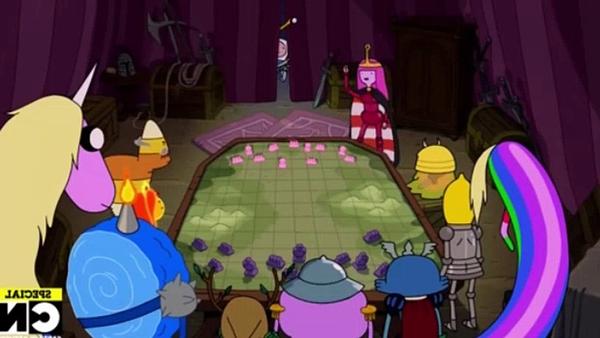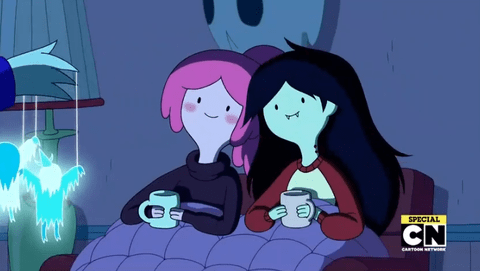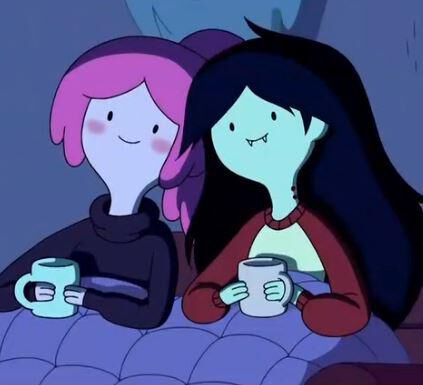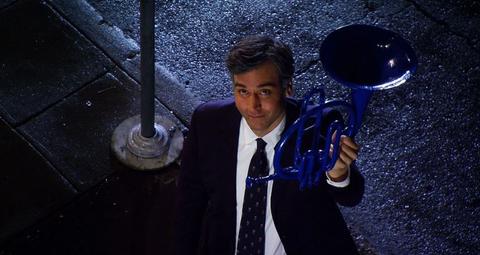“Time is an illusion that helps things make sense
So we are always living in the present tense
It seems unforgiving when a good thing ends
But you and I will always be back then
You and I will always be back then
Singing will happen, happening, happened
Will happen, happening, happened
And will happen again and again
‘Cause you and I will always be back then.”
-Adventure Time, “Come Along With Me”

Before we commence our meditation on endings both satisfying and disappointing, it should go without saying but SPOILERS, SPOILERS, SO MANY SPOILERS! We're talking about endings, people—both about their significance and about the endings themselves. So, if you're hoping to avoid Adventure Time, Buffy the Vampire Slayer, Lost and How I Met Your Mother spoilers, turn around and find an article with a title like “Kittens and Rainbows and No Spoilers Whatsoever” to read instead. We won't be offended. And now on to your feature presentation …
It seems to be a season of endings. The eighth and final season of Game of Thrones kicked off April 14 and concludes May 19, terminating a series that began eight years ago. On March 22, Supernatural stars Misha Collins, Jensen Ackles and Jared Padalecki announced to the world that the show's fifteenth season would be its last. And on April 25, Avengers: Endgame promises a conclusion to the battle between the Mad Titan Thanos and the titular superheroes, an ending built on 22 films and 11 years' worth of stories. It's difficult to imagine an ending worthy of all those years of fan dedication, investment and tears.
But what makes a good ending? And can any ending really be good when all you want as a fan is to stay wrapped in the warmth and comfort of your favorite characters and worlds forever? Maybe the best measure is whether the ending leaves you—the fan—at peace with the fact of the story being over, whether that requires happily ever afters or a giant bloodbath.
The New Yorker explored the subject of endings in “An Anatomy of Endings,” specifically inspired by the end of The Sopranos, which the article characterized as “a Huh? Ending with a soft landing.” According to The New Yorker, “endings divide into the Closer, which seeks for some chorale-like finality” or “the Clincher, which surprises us by tying story-strings together in an unexpected way, or else throwing a new, ironic light on the whole recent past.”
Within that framework are subgenres known as the Cop-out, the Letdown, the Tie-up, the Wrap-up, the Aha! and the Huh? and although the article resists assigning superiority to one category of ending over another, it's clear that the Cop-out and the Letdown are not considered satisfying by fans. As for why endings matter, The New Yorker theorizes, “Endings haunt us because they are our mortality formalized.” Whether that's true, there's no denying that fans who have invested hours, months or even years of their lives in their favorite characters feel some sense of ownership over how their stories end.
One recent emotionally wrought series conclusion, and the fan reaction, highlights the importance of concluding a story well, whatever that means. Adventure Time, which The New York Times called “TV's surreal masterpiece” ran from April 2010 to September 2018 spanning 20 seasons and 283 episodes. The New York Times also glowingly called the show “one of the visual and artistic wonders of the last decade, a gorgeously lacquered jawbreaker with a bittersweet center” and “one of the most emotionally real shows on TV” setting the bar for an ending that would do justice to a show that is considered a pioneer in the television industry.

Rather than attempt to squeeze a meaningful ending into 11 minutes—the usual length of an Adventure Time episode—the writers decided to do a four-episode conclusion titled “Come Along With Me.” In classic Adventure Time style, the conclusion was sweeping, philosophical, difficult to pin down. The New York Times loved it, stating:
“Monday's quadruple-length finale is full of this kind of tender insight — not to mention curtain calls for dozens of characters and a climactic battle that's half Armageddon, half family-therapy session. It's thrilling and sweet and a little bit tearful. But like the goodbyes of childhood — graduation, moving away — the end of Adventure Time feels both poignant and right, the kind of ending that's necessary to make new beginnings possible.”
Forbes seemed to agree, asking: “What kind of ending could possibly conclude such a twisted, tendrilled tale? True to form, the finale gave us an ending that was really a beginning. Adventure Time has always emphasized a Buddhist-style philosophy of endless renewal; death leads to rebirth, chaos to order, to chaos again, again, and again.”
But perhaps the most significant thing about this finale is that it was also a meditation on endings. BMO sings, “Time is an illusion that helps things make sense/ So we are always living in the present tense/ It seems unforgiving when a good thing end/ But you and I will always have back then.” But it's also a meditation on other types of endings as well. Finn, about to be crushed in the stomach of a chaos beast named GOLB, despairs, “I always figured I'd go out saving somebody.” To which Simon Petrikov replies, “Hey, no one gets to choose how it happens. The most important thing is we're together.”

But not all endings are a beginning, or philosophical or overwhelmingly praised by fans and critics. The final episode of Lost—appropriately titled “The End”—aired May 23, 2010 and people are still arguing about what actually happened and whether these events qualify as a good or bad ending. The Independent posted “Lost ending explained: What actually happened in the most misunderstood finale of all time” in February of 2019, nine years after the episode first aired, proving that the subject remains contentious and confusing.
25YL took on the broad task of “looking at both the best and worst finales and what made them great (or not so great)” in a series titled “Art of the Finale.” Among the more than a dozen shows addressed was the hugely popular finale of Buffy the Vampire Slayer, discussed 16 years after it first aired. 25YL's perspective on both the show and finale is positive, which isn't particularly surprising considering that the finale, called "Chosen," found its way onto Entertainment Weekly's “20 Best TV Finales Ever” alongside M*A*S*H, Star Trek: The Next Generation, Six Feet Under and Battlestar Galactica, among others.
“Over 15 years later, ‘Chosen' is still lauded as one of the best television finales ever…It can be argued that one of the main reasons that ‘Chosen' continues to be regarded so highly is because the themes at the core of Buffy, which culminate and are so effectively utilized in the finale, are still relevant today, perhaps even more so than they were back in 2003," the 25YL article argues.

By 25YL's estimation, the measure of a good ending is its commitment to honoring the story and characters. “Buffy was always concerned with dismantling the patriarchy. The very nature of the show's premise—the pretty blonde girl in the dark alley finally getting the chance to fight back instead of being killed—grew to become so much more. It's a commentary on strength in its myriad forms and definitions, bravery, and most importantly power—its trials, dangers, the great responsibility that comes along with it, and the many ways in which it can be used and abused.”
In "Chosen" Buffy made a bold decision: She would share the power that had marked her as singular since she first became a Slayer, triumphing over and subverting the Shadow Men who created the first Slayer centuries earlier. One Slayer could not impede the coming apocalypse, but a dozen slayers armed with a scythe forged by The Guardians could and Willow had the necessary power to cast the necessary spell to make that happen. The decision to completely rock the show's core mythology in the final episode was undeniably bold and potentially a risk, but the fans were there for it.
“So here's the part where you make a choice,” Buffy announces her bold plan to the Scooby Gang. “What if you could have that power now? In every generation one Slayer is born, because a bunch of men who died thousands of years ago made up that rule. They were powerful men. This woman [Willow] is more powerful than all of them combined. So I say we change the rule. I say my power should be our power. Tomorrow, Willow will use the essence of this scythe to change our destiny. From now on every girl in the world who might be a Slayer will be a Slayer. Every girl who could have the power will have the power. Can stand up, will stand up. Slayers, every one of us. Make your choice. Are you ready to be strong?”
Buffy was no longer the Slayer irrevocably altering the show's concept and title (Buffy a Vampire Slayer doesn't quite have the same ring, does it?), but she remained a Slayer and most of her allies survived the attempted apocalypse.
In case you were wondering which show finales landed in 25YL's unenviable bad finale category in their Art of the Finale series, How I Met Your Mother was at the top of the list for the inverse of the reason that Buffy the Vampire Slayer's finale was at the top of the list. “At best, the show's final twist—that Ted has essentially held his kids hostage listening to a long, rambling story about his early thirties in order to ask them permission to date their ‘Aunt Robin'—negates any attempt at thematic consistency for the rest of the show,” the article critiques. “At worst, it suggests that everything in the world exists to satisfy the romantic whims and nostalgia of one man, with all his friendships and romantic relationships subsumed within that.”
At the end of the day, endings matter because stories matter. If we weren't so thoroughly invested in the characters and narrative, the question of whether the finale did justice to the story wouldn't be quite so consequential. People certainly wouldn't still be discussing and debating what happened over a decade later. So here's hoping that if your favorite stories must end—and all stories must, it seems—that they do so in a manner you consider satisfactory, fulfilling and worthy of your fandom.







 Items in your cart may be affected with updated location.
Items in your cart may be affected with updated location.




































